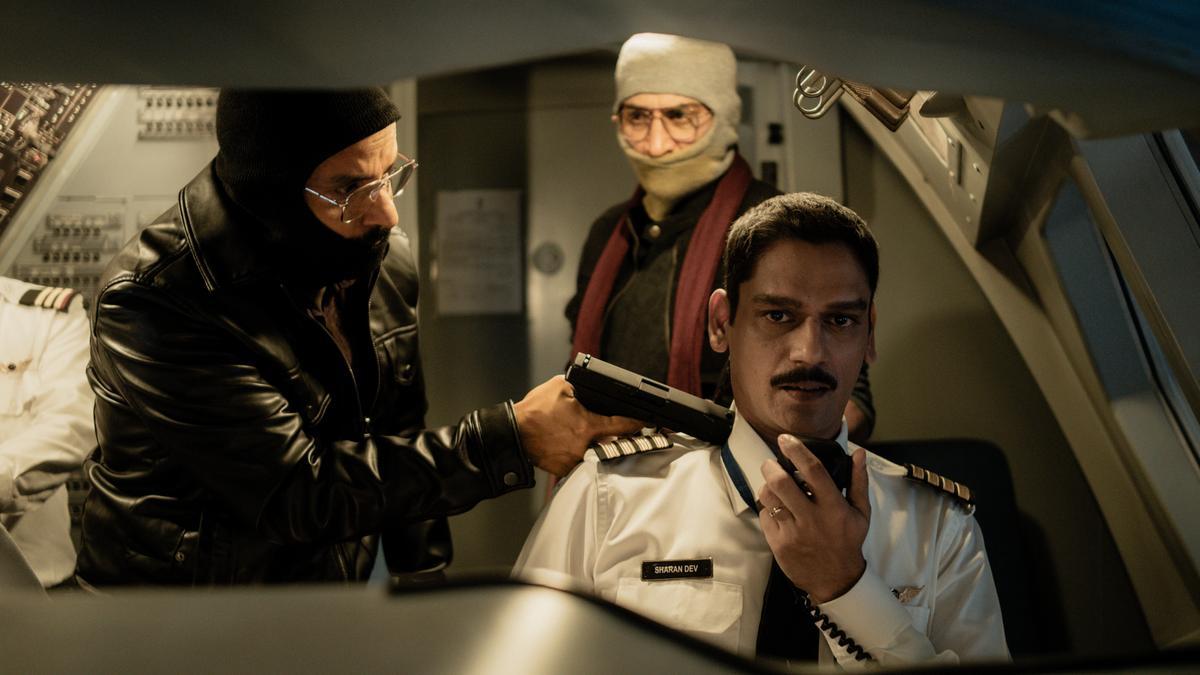
Netflix’s latest web series “IC 814: The Kandahar Hijack” encountered significant backlash early this week as social media users expressed outrage over the names of the four hijackers in the critically-acclaimed series. The outcry has resulted in the Information & Broadcasting Ministry summoning Monika Shergill, the content chief of the OTT platform, to address the concerns. Additionally, a public interest litigation has been filed before the Delhi High Court by the president of the ‘Hindu Sena’, alleging that the series distorts the religious identities of the hijackers by naming two of them Bhola and Shankar, and demands the revocation of the series’ certification.
Directed by Anubhav Sinha, the six-episode series chronicles the harrowing hijacking of the IC-814 flight on December 24, 1999, shortly after its departure from Kathmandu to Delhi. The Airbus 300 was redirected to Amritsar, Lahore, Dubai, and finally to Kandahar in Afghanistan, then under Taliban control. Following six grueling days of negotiations, the hijacking concluded with the Atal Bihari Vajpayee-led NDA government agreeing to release three notorious terrorists—Masood Azhar, Omar Saeed Sheikh, and Mushtaq Ahmad Zargar—in exchange for the safety of the passengers and crew.
The series, which draws partial inspiration from “Flight To Fear,” a first-hand account by the plane’s pilot, Captain Devi Sharan, co-authored with journalist Srinjoy Chowdhury, includes a disclaimer that it is a work of fiction set against real-life events. However, the creative liberties taken by the filmmakers have sparked a cacophony of discontent, particularly over the names assigned to the hijackers.
The controversy stems from the depiction of the hijackers using aliases during the hijacking but not making it explicitly clear in the series. This omission has led to criticism that the show misrepresents historical facts, fueling fears that future recollections of the event might be skewed. According to several journalistic accounts, including a Union Home Ministry press release dated January 6, 2000, the actual names of the hijackers were Ibrahim Athar, Shahid Akhtar Sayeed, Sunny Ahmed Qazi, Mistri Zahoor Ibrahim, and Shakir. The press release also confirmed the aliases adopted by the hijackers: Chief, Doctor, Burger, Bhola, and Shankar.
.
“To the passengers aboard the hijacked plane, these hijackers were known respectively as (1) Chief, (2) Doctor, (3) Burger, (4) Bhola, and (5) Shankar, the names by which the hijackers invariably addressed one another,” the release stated.
The unease among critics appears to be more about the potential for historical misunderstanding in the future rather than the depictions themselves. BJP leader Amit Malviya voiced concerns on social media platform X, stating, “The hijackers of IC-814 were dread terrorists, who acquired aliases to hide their Muslim identities. Filmmaker Anubhav Sinha legitimized their criminal intent by furthering their non-Muslim names. Result? Decades later, people will think Hindus hijacked IC-814.”
Though the series does not explicitly clarify that Bhola and Shankar are codenames, it does reveal the true identity of Chief when negotiations reach an impasse. Journalist Neelesh Misra, who also authored a book on the subject, corroborated on X that Chief was indeed the brother of Masood Azhar. Within the narrative context, Bhola and Shankar remain minor characters, and their codenames are used sparingly throughout the six episodes.
The controversy raises significant issues about the portrayal of sensitive historical events in media and the responsibilities of content creators towards factual accuracy. It also highlights the delicate line between creative liberty and historical documentation, particularly when dealing with events that hold significant cultural and political ramifications.
As the debate continues, Netflix, the series’ production team, and the broader film industry may find themselves reevaluating their approach to depicting historical events, ensuring they respect both the truth and the creative aspects that make for compelling storytelling. The outcome of the public interest litigation in Delhi High Court, as well as the ministry’s response, could potentially set a precedent for future works depicting real-life incidents, and might influence how historical narratives are crafted and consumed in the digital age.












